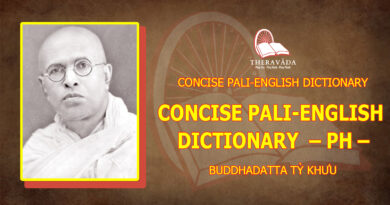THE PATTHANUDDESA DIPANI – CHAPTER 1: HETU-PACCAYA
THE PATTHANUDDESA DIPANI – CHAPTER 1: HETU-PACCAYA
What is the Hetu-relation? Greed (lobha), hate (dosa), dullness (moha), and their respective opposites, viz’, disinterestedness (alobha), amity (adosa), intelligence (amoha) are all hetu-relations.
What are the things that are related by these hetu-relations? Those classes of mind and of mental qualities that are in coexistence along with greed hate, dullness, disinterestedness, amity, and intelligence, as well as the groups of material qualities which coexist with the same, are the things that are so related. All these are called hetupaccayuppanna Dhamma, since they arise or come into existence by virtue of the hetu-relation.
In the above exposition, by “the groups of material qualities which coexist with the same” are meant the material qualities produced by kamma at the initial moment of the hetu-conditioned conception of a new being, as well as such material qualities as may be produced by the hetu-conditioned mind during the lifetime. Here by “the moment of conception” is meant the nascent instant of the rebirth-conception, and by “the lifetime” is meant the period starting from the static instant of the rebirth-conception right on to the moment of the dying-thought.
In what sense is hetu to be understood? And in what sense paccaya? Hetu is to be understood in the sense of root (mulattha); and paccaya in the sense of assisting in the arising, or the coming to be, of the paccayuppanna Dhamma or upakarattha. Of these two, mulattha is the state of being a root of the root, greed–and so on, as shown in Mula- yamaka. We have illustrated this mulattha in the Mula-yamaka-dipani by the simile of a tree. However, we shall deal with it here again.
Suppose a man is in love with a woman. Now so long as he does not dispel the lustful thought, all his acts, words and thoughts regarding this woman, will be cooperating with lust (or greed), which at the same time has also under its control the material qualities produced by the same thought. We see then that all these states of mental and material qualities have their root in lustful greed for that woman. Hence, by being a hetu (for it acts as a root) and by being a paccaya (for it assists in the arising of those states of mind and body), greed is hetu- paccaya. The rest may be explained and understood in the same manner- i.e., the arising of greed by way of desire for desirable things; the arising of hate by way of antipathy against hateful things; and the arising of dullness by way of lack of knowledge respecting dull things.
Take a tree as an illustration–we see that the roots of a tree, having firmly established themselves in the ground and drawing up sap both from soil and water, carry that sap right up to the crown of the tree, and so the tree develops and grows for a long time. In the same way, greed, having firmly established itself in desirable things and drawing up the essence of pleasure and enjoyment from them, conveys that essence to the concomitant mental elements, till they burst into immoral acts and words. That is to say, greed brings about transgression as regards moral acts and words. The same is to be said of hate, which by way of aversion draws up the essence of displeasure and discomfort, and also of dullness, which by way of lack of knowledge cherishes the growth of the essence of vain thought on many an object.
Transporting the essence thus, the three elements, lobha, dosa, and moha, operate upon the component parts, so that they become happy (so to speak) and joyful at the desirable objects, etc. The component parts also become as they are operated upon, while the coexistent material qualities share the same effect. Here, from the words Sampayutta-dhamme abhiharati, it is to be understood that lobha transports the essence of pleasure and enjoyment to the concomitant elements.
Coming now to the bright side–suppose the man sees danger in sensual pleasure, and gives up that lustful thought for the woman. In doing so, disinterestedness as regards her arises in him. Before this, there took place impure acts, words and thoughts having illusion as their root; but for the time being these are no longer present and in their stead there arise pure acts, words and thoughts having their root in disinterestedness. Moreover, renunciation, self-control, Jhana-exercise or higher ecstatic thoughts also come into being. Disinterestedness (alobha), therefore, is known as hetu-paccaya, it being a hetu because it acts as a root, while it is a paccaya because it assists in the arising of the concomitant. The same explanation applies to the remainder of disinterestedness and also to amity and intelligence, which three are the opposites of greed, hate and ignorance respectively.
Here, just as the root of the tree stimulates the whole stem and its parts, so it is with disinterestedness. It dispels the desire for desirable things and having promoted the growth of the essence of pleasure void of greed it cherishes the concomitant elements with that essence till they become so happy and joyful that they even reach the height of Jhanic-, Path-, or Fruition-pleasure. Similarly, amity and intelligence respectively dispel hate and ignorance with regard to hateful and dull things and promote the growth of the essence of pleasure void of hate and dullness. Thus the operation of the three elements (alobha, adosa, and amoha) lasts for a long time, making their mental concomitants happy and joyful. The concomitant elements also become as they are operated upon, while the coexistent groups of material qualities are affected in the same way.
Here the word lobhavivekasukharasam is a compound of the words lobha, viveka, sukha and rasa. Viveka is the state of being absent. Lobhaviveka is that which is absent from greed, or, is the absence of greed. Lobhaviveka-sukha is the pleasure, which arises from the absence of greed. Hence the whole compound is defined thus: Lobhavivekasukharasa is the essence of pleasure, which is derived from the absence of greed.
What has just been expounded is the Law of Patthana in the Abhidhamma. Turning to the Law of Suttanta, the two elements of dullness and greed, which are respectively, termed nescience and craving, are the entire roots of all the three rounds of misery [1]. As to hate, it, being the incidental consequence of greed, is only a root of evil. The two elements of intelligence and disinterestedness, which are respectively termed wisdom and the element of renunciation, are the entire roots for the dissolution of the rounds of misery. As to amity, it, being the incidental consequence of disinterestedness, is only a root of good. Thus the six roots become the causes of all the states of mind and body, which are either coexistent or non-coexistent. Now what has been said is the Law of Suttanta.
[End of the Hetu-Relation]
FOOTNOTES AND REFERENCES:
[1]:
See Compendium of Philosophy by S.Z. Aung and Mrs. Rhys Davids, Page 190.









